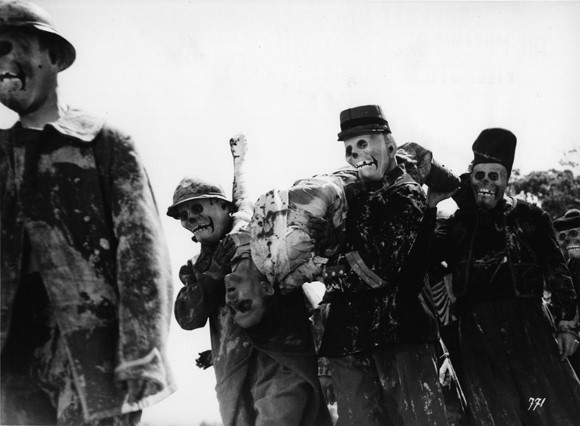J'accuse (1919)
Abel Gance "J'accuse"
After the horrors of World War I, France was in a state of bitterness. Many were traumatized by the horrors of the war. Many were bitter and resentful. Many acted as if the war never happened. To those people, Abel Gance would say, "J'accuse!" The phrase 'j'accuse' is a quotation from the French novelist Emilie Zola. It literally translates to 'I accuse,' however the intention is that of bitter denunciation. Abel Gance was able to expertly capture the public mood of France after the war with his 1919 film "J'accuse."
The film centers on a love triangle between a poet named Jean, his lover Edith, and her husband Francois. The love triangle breaks apart after the war begins in 1914. Francois is enlisted and leaves for battle, Edith is captured by Germans, and Jean enlists to avenge her. When Jean comes home on leave years later, he discovers that Edith has returned, with the child of her German rapist. Jean takes the child as his own, believing that Francois would kill the child if he found out. When Francois gets back from battle, he finds out about the child and almost kills him. Francois has a change of heart to both the child and Jean. When Francois and Jean go back to the battlefield, Francois is killed. Meanwhile, Jean returns home from the war a mentally unstable man. He warns the villagers that the dead will rise up from the ground and accuse those who take their death in vain.
Despite Abel Gance saying that "J'accuse" is not a political film, it still denounces the war (and war in general). This film was the first film to really bring audiences into the battles of World War I, which had ended a year prior. It also showcased the damaging effects the war had on its participants, both on the front lines and back home. In fact, for some of the battle sequences, Gance filmed real war battles, specifically the Battle of Saint-Mihiel. The freshness and realness with which Gance depicted the events was a turning point in the history of cinema. Films were usually seen as an escape from reality. However, "J'accuse" depicted real events (in the midst of a non-fiction story) in order to force the audience to face reality.
Another fascinating element of the film was the scene involving the dead coming back to life. In order to shoot this, Gance had used over 2,000 soldiers who were on leave at the time. The soldiers rose up off of the ground and walked zombie-like to haunt those in the village. According to Gance, the soldiers he used were only on leave for a couple of weeks and were due back on the battlefield after filming. Over 80% of those soldiers had been killed within a few weeks after filming that sequence. This adds a haunting element, for sure. Audiences who were watching it in 1919 were witnessing actual dead soldiers on screen. The soldiers, haunting those who had survived, were accusing them of taking their death for granted. In that vein, these now deceased soldiers were haunting the film screen asking viewers to do the same.
The film was a great success in France, as it perfectly captured the mood of the country. Anger, bitterness, accusation, trauma, etc. were all on display in the film, which perfectly encapsulated the national temperament. The film did not do so well in the United States, however, as its pacifist themes were unfavorably regarded. However, after Gance played the film to D.W. Griffith and Lilian Gish, Griffith allowed the film to be distributed through United Artists, as he was greatly moved by it.
"J'accuse" was a turning point in French cinema and ushered in an era of experimentation with filmmaking techniques as well as thematic realness. Its portrayal of a nation in pain was the exact thing France needed at the time. Its depictions of war, its revelations about the human condition, its auteurist viewpoint, and innovative filming techniques make it one of the greatest accomplishments of the 1910s.




Comments
Post a Comment